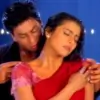Originally posted by: rinki_99
Thank you for the answers...
Ohhh it feels like heaven....
You love movies so much and such a big fan of old hindi movies....oh my God...why didn't I ask you this before???
BHWAHHAHAA. Old is gold. They have their own unique vibe. I am honestly more of a series person. Ask my favourites i won't finish typing until Vanshaj ends
Chalo.....we will enjoy.... ..or I can say I will enjoy with a partner now...
..or I can say I will enjoy with a partner now...
hayeee, finally someone who relates to this
Abb begin with Indian movies
1: What is your interpretation of the ending of Haider? And why??
This film was a masterpiece on all fronts. It coherently adapted Hamlet while curating its own identity as well as a flock of memorable characters that facilitate our understanding of this intricate world of politics and love through their eyes. It explores themes like revenge, politics, betrayal, hatred, forgiveness, justice and love in all forms. I cannot stress enough how well contemporised the past and present geopolitical conflicts of Kashmir were in this retelling of Shakespeare's Hamlet. What setting could be better than this, where vengeance, forgiveness, power play, and deep-seated conflicts over land are at its core? Needless to say, without this setting, Haider would have failed to attain its status as one of Vishal's best works.
Haider is a dark and gripping tale of a young boy seeking answers about his father's disappearance, getting sucked in by the unfortunate circumstances of his environment and destructive family secrets. The first half effectively builds up these characters and the setting for the absolutely chaotic second half. In the end, you could argue that Haider was both the villain and hero of his story.
His desperation turns into sadness, the sadness turns into rage, rage turns into hatred. Haider slowly but surely descends into madness as he comes to realise that his uncle was the reason behind his father's death. There is a moment of hesitation where he thinks Roohdar (the name is a subtle nod to Hamlet - The ghost that visited Hamlet spurring him on to seek revenge) is lying to him even though he knows the truth. This confusion gives us a glimpse of the Haider he used to be, one who wants to see the best in everyone and refuses to believe his uncle could be so ruthless. The first time he spared Khurram's life was because he was in prayer. Despite his quest for vengeance and impending downfall, he displays a level of perception and understanding of religious sentiments. He is hesitant to disrupt the peace of prayers with violence and murder. It also hints at Haider's ability to forgive in the phase of intertwined moral and spiritual beliefs. The juxtaposition of Haider's inner turmoil and the sanctity of prayer couldn't be any more apparent.
I applaud Tabu for breathing life into this complex character. Ghazal is a woman shackled by her forbidden desires and passion. The relationship with her son, a major driving force behind the story, is compounded by an unexplainable attraction, hatred, betrayal and the Oedipus Complex. Ghazala's betrayal towards her husband, whether intentionally wishing his death or not, bore repercussions for her son. But her love for him is apparent because "there is no greater pain than to see the corpse of your own child". I believe that is also why she wanted to get him institutionalised (I found it interesting that they compared London to a halfway house). The loss of his personal identity, a consequence of terrorism, does not negate that love and affection. The clash in their worldviews is a tragic outcome of the circumstances they find themselves in.
In the original, Hamlet contemplates living or dying. He compares the tranquillity of leaving this tumultuous world with the need to stay and avenge his father's death. If he chooses the latter, will he pay for this sin with his soul? This is the moral dilemma that Haider faces in the culmination of the film. I think it is also worth mentioning that while Hamlet/Haider only toys with the idea of suicide, Arisha and Ghazala both succumb to death because of this very reason.
The visual aspect of slowed time, as Ghazala pulls the pin, enhances the emotional viewing experience and accentuates the fact that the characters (Haider and Khurram) are out of time to make different choices. The passage of time in those few seconds is a heavy burden to bare for both. The bomb goes off and there is no turning back.
With that said, I have a couple of interpretations of the ending.
At the brink of insanity, Haider is confronted with the arduous moral choice to avenge his father or set himself free of sin. In spite of his unquenchable thirst for revenge, he walks away from Khurram who begs, for death for a life without his love is far worse than death. Haider as a character is the personification of confusion and nativity. He serves as a glimpse of how, if one is not well looked after, impressionable youths can be easily influenced and led astray. In the same vein, it was imperative for Haider to stay alive in the final act of the film, unlike his counterpart in Hamlet. Haider isn't just a retelling of Hamlet. It is a spectacle of the Kashmir conflict. For all intents and purposes, Haider as a character also brings hope in this retelling of the political conflicts at hand. "Revenge begets revenge." perfectly sums up this scene. Sparing Khurram's life symbolizes a break from the unending cycle of violence, death and pain. this is a reflection of Haider's struggle for control over his moral ambiguity. He is the most lucid in this moment as he refuses to kneel before his desire for bloodshed. Forgiveness is the road to redemption and one day, Haider will get there because his guilt won't let Ghazala's sacrifice be in vain.
This one is probably a more controversial take. In some instances, the love between Haider and his mother goes beyond just that. Haider sparred Khurram's life because he wished that were him - the man who killed the husband and got the girl. Killing Khurram would be killing the man he wanted to be.
Additionally, leaving him crippled and at the mercy of the Almighty to grant death (because we know Haider does hold onto some religious beliefs), would be revenge in itself. Haider lost his father and that grief destroyed him. Khurram was the reason behind the love of his life committing suicide, that guilt won't let him live in peace either. Haider unintentionally acknowledges the human complexities and demonstrates a twisted sort of empathy.
These are my interpretations and I could be wrong about some things so take it with a pinch of salt.
2: Which scene of ZNMD you love the most and why???
the running with the bulls scene cause all the characters were just so unhinged especially with the "agar main zinda raha toh" lines absoultly chaotic friendship shenanigans
absoultly chaotic friendship shenanigans
What was wrong with Kabir and Natasha relationship according to you?
They wanted different things in life and their world views were just so different.
3: What was wrong with Manav's character in Dil dhadakne do according to you?
manav is a misogynist and a non-supportive husband. He was downright emotionally abusive, controlling and toxic towards Ayesha. i loved the way Sunny shut him up at the party.
4: What is your opinion regarding the relationship of
Kamal Mehra and Neelam (played by Anil and Shefali)
Sad reality. They portray everything thing as happy and healthy on the surface but they make each other miserable. Neither of them are blameless. If one controls and maniuplates, the other doesn't want to step out of their comfort zone. They are both examples of people harboured by societal expectations and familial obligations. If you remember the ending sequence in "phir bhi yeh zindagi", the mehras were all wearing black- the colour of darkness and power. that is exactly what this couple and Mehras as a whole are. Dysfunctional beneath the facade of the perfect family.
Kabir and Farah (Ranveer and Anushka)
they were just a fun couple that i enjoyed watching and was rooting for them. Kabir literally swam across the ocean to prove his love. 
Ayesha and Sunny( Priyanka and Farhan)
I think they needed a little more development to grow on me. But I loved how supportive sunny was.
5: i really like Kuch kuch hota hai,you can see that in my DP...but what is your opinion regarding the current criticism around it..??
I love KKHH too. I was a tween when I first watched it and like others, was smitten by the chemistry between Kajol and SRK. it is still one of my go-to movies when I am having a bad day. It's the nostalgiaia.
however, i will not deny that it has not aged well. I am of the opinion that Rahul getting married to Tina wasn't wrong. I believe that he was genuinely in love with her at that time. But he shouldn't have gotten married to Anjali in the end. I absolutely hate the fact that Anjali transformed herself for Rahul. That should have been fueled by intrinsic motivations rather than love. The two of them should have moved on after a decade-long absence. Other laughable aspects in the younger anjali playing cupid like bro why?
Do you think Rahul is a selfish character??
I wouldn't use the word selfish. I would say that he was just really indecisive for a 40 year old.
6: What according to you makes Sholay on of the greatest commercial indian cinema??
you mean other the actors, characters, comedy,songs, storyline, background score, old school village setting, cinematography, jai's iconic flute, dialogues, action sequences and overall vibe?
I think the friendship between the two protagonists was the highlight, at least for me. Jai literally sacrificed his life for Veeru at the bridge cause he knew there was no way they both would survive. The personal loss and tragedy of Thakur family were weaved in strategically to evoke empathy. basanti the talkative happy-go-lucky girl with the eccentric Veeru was hilarious. the contrast with jai's understated relationship with Radha which is built on understanding and maturity, you have a movie that caters to all. and the jailer
Amitabh, Dharmender, Hema, Amjad, Sanjeev, and of course mausi were just so earnest in their performances, it stole my heart. Plus the villains were scary af. Gabber was the monster under my bed
were just so earnest in their performances, it stole my heart. Plus the villains were scary af. Gabber was the monster under my bed 
but then again, I am looking at it with a lot of nostalgia so take that as you will.
7: What do you think about Ranbir Kapoor's character in Rockstar??
bro was a misunderstood character that deserved more
8: What according to you is the best aspect of Taare Zameen par???
In your previous question thread, if you had asked me which movie character describes me the best, I would have said Ishaan from Taare Zameen par the struggles he went through were just so relatable. That's the best aspect of it- the relatability.
It's the story of a neurodivergent child who excels in the arts but struggles academically in a conventional education system that prioritises academic achievements. It explores the themes of education, identity and individuality. The trauma and pain of separation turned this cheerful child into a quiet, shy and timid individual. The shine in his eyes was drained away in the boarding school that used coporal punishment as a means of discipline. The misconceptions surrounding this learning disability were effectively challenged and debunked through Ishaan.
To put it harshly, the education system failed this child. It failed to not just accommodate his needs but to protect him from unversed teachers who take out their frustrations on children and peers who would not spare a chance to make fun of him.
the parents in this movie are also portrayed so realistically. The strict father who doesn't want to listen to his child and the helpless mother, are both typical parents in any household. ishaan's parents could not understand his learning difficulties and instead pressured him to perform better in school. That was, unfortunately, his downfall. However, the change in perspective by the end demonstrates the need for supportive and understanding parents as they have a direct impact on a child's mental health and growth
It wasn't until I met the kind and compassionate teacher that he learned to open up again. Nikumbh shows us how crucial an inclusive and personalized approach is to nurture talents beyond the classroom and foster confidence. Like parents, educators also have a profound impact on children. Though unconventional, Nikumbh's dedication and patience with Ishaan led to him excelling.
The use of vibrant colours and childlike animations allowed us to explore Ishaan's world. The innocence and naivety radianted off his artworks. The one that really hit me was his sketch book wherein he in the family picture on the last page. That fear and anxiety of abandonment were very real.
9: How did a movie like Rang de Basanti that exposed the dirty politics and blame game impact a young mind like you???
It made me more cognizant of things happening around me. A lot of things started making more sense. The message that drove home at the end of the film was really, "Change starts from me."
10: What is the one aspect where older Movies were better than newer and what is one area where new movies are better than old ones.
Newer ones are much more progressive. They don't propagate as many gender stereotypes, racist notions and things like that. Most films no a day strive to be thought-provoking and new. That's both good and bad. Sometimes I just want to watch a mindless comedy without it getting preachy.
That's where old movies are better. they don't preach as much. The performances (acting) are way better. The music was top-notch. I just like the old-school vibes. They were so simple and relatable at that time. The characters are much more memorable and well-crafted even if they are villains.
Also soo agree with you on Simi Garewal...she was sooo ahead of her time.. specially in Chalte Chalte...she was oozing sensuality,cutzpah and soo glamorous...she was also very good in Karz...A classy woman...
bro was so good in chalte chalte that i can never watch that movie again. The songs yes, but the movie no. especially the end where she goes full on psycho. I still get nightmares 
what is karz about?
I will return.... ....
....
swag se karange swagat













 but I'd say, being with people who make me forget the things I am stressed about and knowing that the effort I am investing in these relationships is worth it is happiness.
but I'd say, being with people who make me forget the things I am stressed about and knowing that the effort I am investing in these relationships is worth it is happiness. 





 she was my favourite character of the lot. but they butchered her so bad
she was my favourite character of the lot. but they butchered her so bad . Given the necessary training, bro would be a better heir than DJ and Yuvika combined
. Given the necessary training, bro would be a better heir than DJ and Yuvika combined were just so earnest in their performances, it stole my heart. Plus the villains were scary af. Gabber was the monster under my bed
were just so earnest in their performances, it stole my heart. Plus the villains were scary af. Gabber was the monster under my bed 















